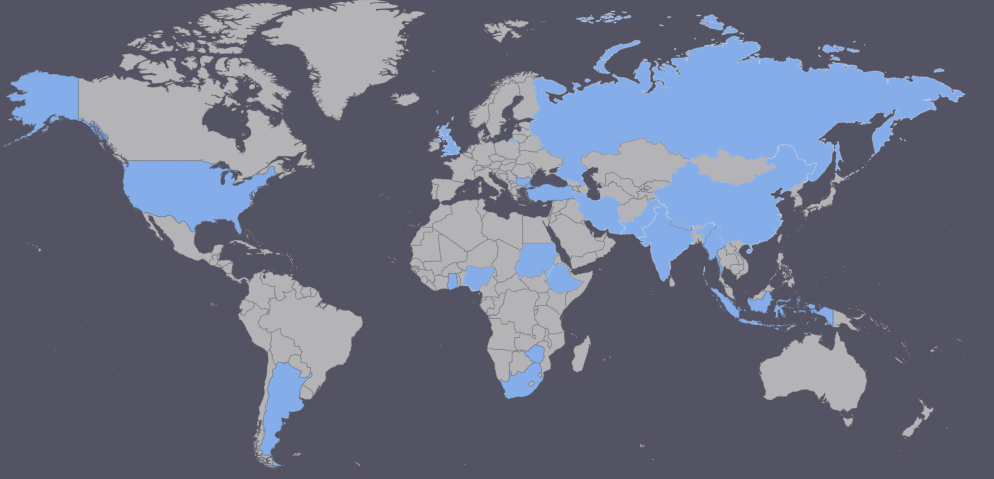Prediction of Pore Fluid and Lithology Using Incompressibility and Rigidity, Offshore Niger Delta, Nigeria
Keywords:
Mu-Rho, Lambda Rho, Density, Velocities, Lame ParametersAbstract
Pore fluid and lithology content was determined using the calculated velocity ratio and Poisson’s ratio. From the analysis of velocity ratio and Poisson’s ratio, the gas sand, oil sand, and brine sand were mapped out. The gas sand predicted from the rock physics analysis using lambda-mho and mu-rho was confirmed by the analysis of velocity ratio and Poisson’s ratio. The analysis of velocity ratio and Poisson’s ratio was used to further describe the wet sand predicted by the rock physics analysis of lambda-mho and mu-rho. The wet sand from the rock physics analysis of lambda-mho and mu-rho was predicted to comprise of oil sand and brine sand. The value of lambda-mho is between 21.74 to 25.67, for mu-rho is between 16.34 to 23.21 for Poisson’s ratio is between 0.25 to 0.29 and for Vp/Vs ratio is between 1.74 to 1.83, these confirm the presence of oil sand in all the seven (7) reservoirs studied in two (2) wells, all the reservoirs fall between the Agbada region (10212.50-11741.00 ft) and have a very good net pay zone ranging from 41.50 ft to 193.00 ft in the Niger Delta region, Nigeria.
References
Agbasi, O.E., Akankpo, A.O., Essien, U.E., 2017. Estimation of Reservoir Potentials of Two Wells in Niger Delta Region, Nigeria. Journal of Geosciences and Geomatics 5 (2), 87-95.
Agbasi, O.E, Igboekwe, M.U., Chukwu, U.G., Etuk, S.E., 2018. Discrimination of Pore Fluid and Lithology of a Well in X Field, Niger Delta, Nigeria. Arabian Journal of Geoscience 11, 274.
Akinyokun, O.C., Enikanselu, P.A., Adeyemo, A.B., Adesida, A., 2009. Well log interpretation model for the determination of lithology and fluid content contents. The Pacific Journal of Science and Technology 10, 507-517.
Akpabio, I.O., Ojo, O.T., 2018. Characterization of hydrocarbon reservoir by pore fluid and lithology using elastic parameters in an X field, Niger Delta, Nigeria. International Journal of Advance Geosciences 6 (2) 173-177.
Akpabio, I., Ibuot, J.C., Agbasi O.E., Ojo, O.T., 2014. Petrophysical Characterization of eight wells from Wire-line Logs, Niger Delta Nigeria. Asian Journal of Applied Science 2 (2) 105-109.
Alger, R.P., 1980. Geological use of wireline logs. In: Hobson, G.D, (ed.), Development in Petroleum Geology – 2. Applied Science Publishers, London, 207-272.
Bahremandi, M., Mirshahani, M., Saemi, M., 2012. Using of Compressional-Wave and Shear Wave Velocities Ratio in Recognition of Reservoir Fluid Contacts Case Study: A Southwest Iranian Oil Field. Journal of Scientific Research and Reviews 1 (2), 015-019.
Brigaud, F., Chapman, D.S., Le Douaran, S., 1990. Estimating thermal conductivity in Sedimentary Basin using lithological data and geophysical well logs: AAPG Bulleting 74 (9), 1459-1477.
Castagna, J.P., Batzle, M.L., Eastwood, R.L., 1985. Relationships between compressional wave and shear wave Velocities in Clastic Silicate Rocks. Geophysics. 50 (4), 571-581.
Chang, H-C., Kopaska-Merkel, D.C., Chen, H-C., 2002. Identification of Lithofacies Using Kohonen Self-Organizing Maps. Computers and Geosciences 28 (2), 223-229.
Dewar, J., Downton, J., 2002. Getting unlost and staying found – a practical framework for interpreting elastic parameters. Expanded Abstract CSEG Annual Conference.
Ejedavwe, J., Fatumbi, A., Ladipo, K., Stone, K., 2002. Pan - Nigeria exploration well look - back (Post-Drill Well Analysis). Shell Petroleum Development Company of Nigeria Exploration Report 2002.
Eshimokhai, S., Akhirevbulu, O.E., 2012. Reservoir characteri-zation using seismic and well logs data. A case study of the Niger Delta. Ethiopian Journal of Environmental Studies and Management EJESM 5 (4), 597-603.
Goodway, W., 2001. AVO and Lame’ constants for rock parameterization and fluid detection. CSEG Recorder 26 (6), 39-60.
Goodway, W., Chen T., Downton, J., 1999. Rock parameterization & AVO fluid detection using Lamé petrophysical factors; λ, µ and λρ, µρ. 61st EAEG Meeting. Expanded Abstracts, 6-51.
Hami-Eddine, K., Klein, P., Loic, R., Ribet, B., Grout, M., 2015. A new technique for lithology and fluid content prediction from prestack data: An application to carbonate reservoir. Interpretation 3 (1), SC19.
Inyang, N.J. Okwueze, E.E., Agbasi, O.E., 2015. Detection of Gas Sands in the Niger Delta by Estimation of Poisson’s Dampening-Factor (PDF) Using Wireline Log Data. Geosciences 5(1), 46-51.
Inyang, N.J., Akpabio O.I., Agbasi O.E., 2018. Shale Volume and Permeability of the Miocene Unconsolidated Turbidite Sand of Bonga Oil Field, Niger Delta, Nigeria. International Journal of Advanced Geoscience 5 (1), 37-45.
Kearey, P., Brooks, M., Hill, I., 2002. An Introduction to Geophysical Exploration. 3rd Edition. Blackwell Science: Oxford, UK., 236-262.
Klein, C., Philpotts, A., 2012. Earth Materials: Introduction to Mineralogy and Petrology. pp. 361-362.
Kupecz, J.A., Gluyas, J., Bloch, S., 1997. Reservoir Quality Prediction in Sandstones and Carbonates: An Overview. American Association of Petroleum Geologists 69.
Ogungbemi, O.S., 2014. Prediction of Lithology Using the Ratios of Compressional and Shear Wave Velocities and their Travel Times. Pacific Journal of Science and Technology 15, 355- 359.
Okoli, E.A., Agbasi, O.E., Onyekwu, S.O., Etuk, S.E., 2018. Crossplot analysis of rock properties from well log data for gas detection in X-field, coastal swamp depobelt, Niger Delta Basin. Journal of Geoscience, Engineering, Environment and Technology 3 (4), 180-186.
Peng, S., Zhang, J., 2007. Engineering Geology for Underground Rocks. Springer, Berlin, Heidelberg.
Schlumberger, 1989. Log interpretation, principles, and application. Schlumberger wireline and testing. TX. 21-89.
Downloads
Published
Issue
Section
License
Copyright (c) 2020 Odunayo Ojo, Okechukwu Agbasi, Namdie Inyang, Sunday Etuk, Robert Ubong

This work is licensed under a Creative Commons Attribution-NonCommercial-NoDerivatives 4.0 International License.
The authors keep the copyrights of the published materials with them, but the authors are aggee to give an exclusive license to the publisher that transfers all publishing and commercial exploitation rights to the publisher. The puslisher then shares the content published in this journal under CC BY-NC-ND license.



